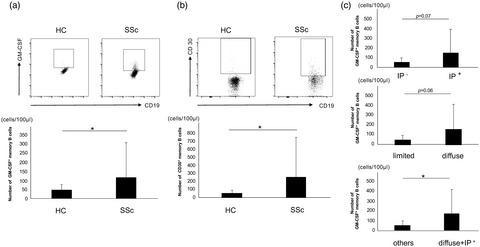当前位置:
X-MOL 学术
›
Clin. Exp. Immunol.
›
论文详情
Our official English website, www.x-mol.net, welcomes your
feedback! (Note: you will need to create a separate account there.)
Generation of a novel CD30+ B cell subset producing GM-CSF and its possible link to the pathogenesis of systemic sclerosis.
Clinical & Experimental Immunology ( IF 3.4 ) Pub Date : 2020-06-15 , DOI: 10.1111/cei.13477 K Higashioka 1 , Y Kikushige 1 , M Ayano 1 , Y Kimoto 2 , H Mitoma 1 , M Kikukawa 3 , M Akahoshi 1 , Y Arinobu 1 , T Horiuchi 2 , K Akashi 1 , H Niiro 3
Clinical & Experimental Immunology ( IF 3.4 ) Pub Date : 2020-06-15 , DOI: 10.1111/cei.13477 K Higashioka 1 , Y Kikushige 1 , M Ayano 1 , Y Kimoto 2 , H Mitoma 1 , M Kikukawa 3 , M Akahoshi 1 , Y Arinobu 1 , T Horiuchi 2 , K Akashi 1 , H Niiro 3
Affiliation

|
Systemic sclerosis (SSc) is a T helper type 2 (Th2)‐associated autoimmune disease characterized by vasculopathy and fibrosis. Efficacy of B cell depletion therapy underscores antibody‐independent functions of B cells in SSc. A recent study showed that the Th2 cytokine interleukin (IL)‐4 induces granulocyte–macrophage colony‐stimulating factor (GM‐CSF)‐producing effector B cells (GM‐Beffs) in humans. In this study, we sought to elucidate the generation mechanism of GM‐Beffs and also determine a role of this subset in SSc. Among Th‐associated cytokines, IL‐4 most significantly facilitated the generation of GM‐Beffs within memory B cells in healthy controls (HCs). In addition, the profibrotic cytokine transforming growth factor (TGF)‐β further potentiated IL‐4‐ and IL‐13‐induced GM‐Beffs. Of note, tofacitinib, a Janus kinase (JAK) inhibitor, inhibited the expression of GM‐CSF mRNA and protein in memory B cells induced by IL‐4, but not by TGF‐β. GM‐Beffs were enriched within CD20+CD30+CD38−/low cells, a distinct population from plasmablasts, suggesting that GM‐Beffs exert antibody‐independent functions. GM‐Beffs were also enriched in a CD30+ fraction of freshly isolated B cells. GM‐Beffs generated under Th2 conditions facilitated the differentiation from CD14+ monocytes to DC‐SIGN+CD1a+CD14−CD86+ cells, which significantly promoted the proliferation of naive T cells. CD30+ GM‐Beffs were more pronounced in patients with SSc than in HCs. A subpopulation of SSc patients with the diffuse type and concomitant interstitial lung disease exhibited high numbers of GM‐Beffs. Together, these findings suggest that human GM‐Beffs are enriched in a CD30+ B cell subset and play a role in the pathogenesis of SSc.
中文翻译:

产生 GM-CSF 的新型 CD30+ B 细胞亚群的产生及其与系统性硬化症发病机制的可能联系。
系统性硬化症 (SSc) 是一种 2 型辅助 T (Th2) 相关的自身免疫性疾病,其特征是血管病变和纤维化。 B 细胞耗竭疗法的功效强调了 SSc 中 B 细胞的抗体独立功能。最近的一项研究表明,Th2 细胞因子白介素 (IL)-4 可诱导人类产生粒细胞-巨噬细胞集落刺激因子 (GM-CSF) 效应 B 细胞 (GM-B effs )。在这项研究中,我们试图阐明 GM-B effs的产生机制,并确定该子集在 SSc 中的作用。在 Th 相关细胞因子中,IL-4 最能显着促进健康对照 (HC) 记忆 B 细胞内 GM-B效应的产生。此外,促纤维化细胞因子转化生长因子 (TGF)-β 进一步增强了 IL-4 和 IL-13 诱导的 GM-B效应。值得注意的是,托法替尼是一种 Janus 激酶 (JAK) 抑制剂,可抑制 IL-4 诱导的记忆 B 细胞中 GM-CSF mRNA 和蛋白的表达,但不抑制 TGF-β 诱导的记忆 B 细胞的 GM-CSF mRNA 和蛋白表达。 GM-B effs在 CD20 + CD30 + CD38 -/low细胞(与浆母细胞不同的群体)中富集,表明 GM-B effs发挥不依赖于抗体的功能。 GM-B effs也在新鲜分离的 B 细胞的 CD30 +部分中富集。 Th2条件下产生的GM-B effs促进CD14 +单核细胞分化为DC-SIGN + CD1a + CD14 - CD86 +细胞,显着促进初始T细胞的增殖。 SSc 患者中的 CD30 + GM-B效应比 HC 患者更明显。 患有弥漫型并伴有间质性肺疾病的 SSc 患者亚群表现出大量 GM-B effs 。总之,这些发现表明人类 GM-B effs在 CD30 + B 细胞亚群中富集,并在 SSc 的发病机制中发挥作用。
更新日期:2020-08-12
中文翻译:

产生 GM-CSF 的新型 CD30+ B 细胞亚群的产生及其与系统性硬化症发病机制的可能联系。
系统性硬化症 (SSc) 是一种 2 型辅助 T (Th2) 相关的自身免疫性疾病,其特征是血管病变和纤维化。 B 细胞耗竭疗法的功效强调了 SSc 中 B 细胞的抗体独立功能。最近的一项研究表明,Th2 细胞因子白介素 (IL)-4 可诱导人类产生粒细胞-巨噬细胞集落刺激因子 (GM-CSF) 效应 B 细胞 (GM-B effs )。在这项研究中,我们试图阐明 GM-B effs的产生机制,并确定该子集在 SSc 中的作用。在 Th 相关细胞因子中,IL-4 最能显着促进健康对照 (HC) 记忆 B 细胞内 GM-B效应的产生。此外,促纤维化细胞因子转化生长因子 (TGF)-β 进一步增强了 IL-4 和 IL-13 诱导的 GM-B效应。值得注意的是,托法替尼是一种 Janus 激酶 (JAK) 抑制剂,可抑制 IL-4 诱导的记忆 B 细胞中 GM-CSF mRNA 和蛋白的表达,但不抑制 TGF-β 诱导的记忆 B 细胞的 GM-CSF mRNA 和蛋白表达。 GM-B effs在 CD20 + CD30 + CD38 -/low细胞(与浆母细胞不同的群体)中富集,表明 GM-B effs发挥不依赖于抗体的功能。 GM-B effs也在新鲜分离的 B 细胞的 CD30 +部分中富集。 Th2条件下产生的GM-B effs促进CD14 +单核细胞分化为DC-SIGN + CD1a + CD14 - CD86 +细胞,显着促进初始T细胞的增殖。 SSc 患者中的 CD30 + GM-B效应比 HC 患者更明显。 患有弥漫型并伴有间质性肺疾病的 SSc 患者亚群表现出大量 GM-B effs 。总之,这些发现表明人类 GM-B effs在 CD30 + B 细胞亚群中富集,并在 SSc 的发病机制中发挥作用。









































 京公网安备 11010802027423号
京公网安备 11010802027423号